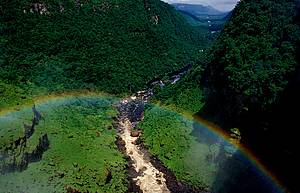
Because of that, WWF (World Wildlife Fund) Sweden has issued a statement urging its government, which currently holds the EU Presidency, “to get behind an effective international agreement on halting forest lossâ€. The annual loss of natural forests in developing countries is equivalent to one third of Sweden’s surface area. Forest fires, the conversion of forests to agricultural land and the cultivation of energy crops are responsible for the high rate of forest loss, the organization says.
The aforementioned plan is called REDD (Reducing Emissions from Deforestation and Forest Degradation) and it is currently being discussed in the negotiations for a global climate deal. The idea is to “make it worthwhile for developing countries to maintain their forests, as opposed to cutting them downâ€.
Take the Indonesian case: there, where large areas of forests are cut down and prepared for palm oil plantations, 80 percent of greenhouse gas emissions come from deforestation. Halting deforestation would not only reduce greenhouse gas emissions, but would also secure the livelihoods of people living in these forests.
“Time is passing and the possibility of reaping the positive climate effects that a stop in the loss of forests entails is decreasing rapidly. Complex social, economic and ecological [factors] are involved which is why a global cooperation for REDD must be carefully prepared,†says Stefan Henningsson, Climate Director, WWF Sweden.
WWF negotiators in Bangkok are urging an institutional structure for REDD which guarantees transparency, effectiveness and long-term financing from developed countries in support of measures in developing countries. In financing, WWF is seeking the equivalent of $US42 billion per year after 2013, a key element of an estimated financing requirement of $US160 billion annually for climate change adaptation and mitigation in developing countries.
The scheme would aim for a goal of zero net deforestation by 2020, with WWF also emphasising that forestry and climate projects must also contribute to the conservation of biological diversity and respect the rights of local and native populations.
Keeping forests is a win-win situation. Less carbon goes into the atmosphere, wilflife and indigenous population keep their homes and the world stay beautiful. What’s not to love about it?

![Reblog this post [with Zemanta]](https://img.zemanta.com/reblog_e.png?x-id=12aec32c-0f2a-4002-8fce-598058355f57)





1 Comment